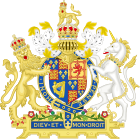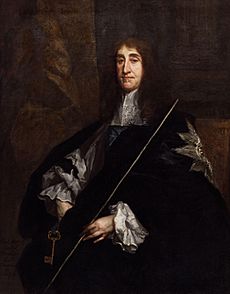Self-denying Ordinance facts for kids

|
|
| Long title | An Ordinance of the Lords and Commons assembled in Parliament, for the discharging of the Members of both Houses from all offices, both military and civil |
|---|---|
| Introduced by | Sir Henry Vane |
| Dates | |
| Commencement | 3 April 1645 |
|
Status: Repealed
|
|
The Self-denying Ordinance was a special rule passed by the English Parliament on April 3, 1645. It said that any member of Parliament (from either the House of Commons or the House of Lords) who was also an officer in the army or navy had to choose one job and give up the other. They had 40 days to decide.
This rule was part of a bigger plan to help Parliament win the English Civil War. Another important change was creating the New Model Army. This new army was professional and controlled by the government, replacing older, local armies. The Ordinance also helped solve a political fight. Some leaders wanted to make peace with King Charles I, while others wanted to keep fighting until Parliament won completely.
The idea for this rule first came up in December 1644. It took two tries to get it passed. Since members of the House of Lords couldn't give up their noble titles, this rule mostly affected important noble commanders like the Earls of Manchester and Essex. They had to resign their army jobs. However, the final version of the rule allowed them to be appointed again later if needed.
Why the Rule Was Needed

When the English Civil War began, Parliament gave command of its main armies to noblemen. This was a common practice back then. For example, the Earls of Manchester and Essex became generals. The Earl of Manchester was in charge of the Eastern Association army, where Cromwell served as a cavalry officer.
However, Parliament soon faced problems with these military leaders. Many of these officers were not professional soldiers. Their skills in warfare were different. More importantly, some of them avoided fighting the King's forces. They hoped that a peaceful agreement with King Charles I was still possible. The Earl of Manchester, a key leader in this group, once said he was worried about the war. He felt that even if they beat the King many times, he would still be King. But if the King won once, they would all be in great danger.
As the war continued, it became clear that Essex and Manchester were not fully committed to fighting the Royalists. This attitude became more obvious as the war became more serious. The disagreements between the House of Lords and the House of Commons grew. This tension reached a breaking point after the great victory at the Battle of Marston Moor. The chance to fully win the war was lost after the disappointing Second Battle of Newbury. After this, the political arguments between Oliver Cromwell and Manchester could no longer be ignored.
Members of Parliament, especially Oliver Cromwell and Sir William Waller, saw that the army needed big changes. Cromwell believed that Manchester's actions were a problem. This led him to criticize the House of Lords, as most nobles shared Manchester's views. To solve this bitter argument, Cromwell suddenly suggested that all officers who were also members of Parliament should resign. This idea would affect him just as much as the Earls of Essex and Manchester.
What the Ordinance Said
The first version of the Self-denying Bill was introduced to Parliament on December 9, 1644. It stated that "no member of either house shall have or execute any office or command" in the armed forces. This bill passed the House of Commons on December 19. However, the House of Lords rejected it on January 13, 1645. The Lords did not want to approve a rule that would automatically remove nobles from military command. This first bill would have also removed leaders who were not fully committed to the war, like Lords Essex and Manchester.
A second version of the bill was then created. This new bill still required officers to resign if they were also MPs. But it did not stop them from being appointed to their positions again later. This second bill was finally agreed upon on April 3, 1645.
Why It Was Important
The Self-denying Ordinance helped the army by separating political disagreements in Parliament from military decisions. Leaders from the "peace party" in Parliament, who wanted to negotiate with the King, gave up their military jobs to keep their political power. Lords Manchester and Essex lost their general positions. Lord Warwick also lost his command of the navy. The leadership of Parliament's troops then went to Sir Thomas Fairfax. He was a lieutenant general and one of the few officers still able to take the job.
In simple terms, the ordinance made Cromwell and his "war party" stronger. Cromwell was a member of the House of Commons, so he also had to resign his army post. However, the Committee of Both Kingdoms, which managed the war, felt his skills as a soldier were too important. His time in command was extended several times, usually for 40 days at a time. Eventually, his appointment became permanent. While he was officially Fairfax's second-in-command, Cromwell had much more influence than his rank suggested.
More broadly, this reform helped create the New Model Army. This new army was organized to be united and efficient. It used many practices that are common in modern armies today. For example, officers were chosen based on their skill, not their family name. Local army units were replaced with national regiments. Training was standardized, and soldiers were paid regularly. This army quickly turned the war in Parliament's favor. They decisively defeated the Royalist forces at the Battle of Naseby on June 14, 1645.
 | Percy Lavon Julian |
 | Katherine Johnson |
 | George Washington Carver |
 | Annie Easley |

